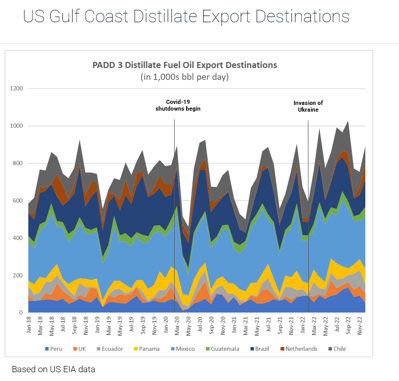Sign up for daily news updates from CleanTechnica on email. Or follow us on Google News!
In 1983, Cambridge Energy Research Associates (CERA) was founded in Cambridge, Massachusetts, by Daniel Yergin and James Rosenfield. The energy research and consulting firm quickly became known for its critical knowledge and independent analysis on energy markets, geopolitics, industry trends, technology, and strategy. Each year, S&P Global hosts CERAWeek in Houston so that fossil fuel muckety mucks from around the world can exchange fist bumps and bask in the warm glow of their own magnificence.
CERAWeek 2024 organizers say this year’s confab will explore strategies for a multi-dimensional, multi-speed, and multi-fuel energy transition. Phew! There sure are a lot of multi-hyphenated ideas in this year’s press kit!
The drive for energy transition is reshaping the competitive landscape for companies and countries — creating new opportunities and risks across the energy value chain, the CERAWeek press materials emphasize. The imperative to reduce emissions has grown in urgency, yet expectations of a simple linear global transition have been shaken as climate goals compete with concerns over how to deliver economic growth while ensuring energy security, energy access, and affordability.
The multi-dimensional energy transition reflects different realities and timelines by region, technology, industry strategies, the variety of social and political approaches, and divergent national priorities in an increasingly multi-polar world, the press kit concludes.
Aramco At CERAWeek 2024
According to Reuters, on the first day of CERAWeek 2024, Amin Nasser, CEO of Aramco, the world’s largest fossil fuel company, told those in attendance that global oil demand will not peak for some time, which means policymakers will need to ensure there are sufficient investments in oil and gas to meet demand. He said demand will not decline any time in the foreseeable future. Nasser went on to say the world should abandon the” fantasy” of phasing out fossil fuels and embark on a “re-set of global energy transition plans.”
Oil demand will reach a new record of 104 million barrels per day in 2024 because, despite growing investments in renewables and electric transport, they have yet to displace fossil fuels at scale, according to Nasser. “All this strengthens the view that peak oil and gas is unlikely for some time to come, let alone 2030. We should abandon the fantasy of phasing out oil and gas, and instead invest in them adequately, reflecting realistic demand assumptions, as long as essential,” he added. His remarks drew enthusiastic applause from the audience. “In the real world, the current transition strategy is visibly failing on most fronts as it collides with five hard realities,” Nasser said during a panel interview covered by CNBC.
Focus On Developing Countries
Nasser suggested that the IEA (International Energy Agency) is focusing on demand in the US and Europe and needs to focus instead on the needs of the developing world. Rising demand from developing economies could feed oil demand growth through 2045, Nasser predicted. His forecast for long-term demand growth was in line with forecasts from the Organization of the Petroleum Exporting Countries (OPEC) and in contrast to the 2030 forecast for peak demand from the IEA. Saudi Arabia is OPEC’s de facto leader, and the United States is the biggest contributor to the IEA.
Nasser said alternative energy sources have been unable to displace hydrocarbons at scale, despite the world investing more than $9.5 trillion over the past two decades. Wind and solar currently supply less than 4% of the world’s energy, while total electric vehicle penetration is less than 3%, he said.
Meanwhile, the share of hydrocarbons in the global energy mix has barely fallen in the 21st century from 83% to 80%, Nasser said. Global demand has increased by 100 million barrels of oil equivalent per day during the same period and will reach an all-time high this year, he said.
The use of methane gas has grown 70 percent since the start of the century, with the transition from coal to methane responsible for two-thirds of the reductions in carbon emissions in the US. “This is hardly the future picture some have been painting,” Nasser said. “Even they are starting to acknowledge the importance of oil and gas security.”
 Chip in a few dollars a month to help support independent cleantech coverage that helps to accelerate the cleantech revolution!
Chip in a few dollars a month to help support independent cleantech coverage that helps to accelerate the cleantech revolution!
Developing nations in the global south, meanwhile, will drive oil and gas demand as prosperity rises in those nations, which represent more than 85% of the world’s population, the CEO said. These nations receive less than 5% of the investment targeting renewable energy, he said.
Nasser added that the world should focus more on reducing emissions from oil and gas and less on increasing the use of renewables. He claimed efficiency improvements alone over the past 15 years have reduced global energy demand by almost 90 million barrels per day oil equivalent. Wind and solar, meanwhile, have substituted only 15 million barrels over the same period, he said. “We should phase in new energy sources and technologies when they are genuinely ready, economically competitive and with the right infrastructure,” Nasser said.
Reducing greenhouse gas emissions from hydrocarbons through carbon capture and other technologies achieves better results than alternative energies, Nasser said. New energy sources and technologies should only be introduced when they are genuinely ready, and economically competitive, he added.
US Energy Secretary of State Jennifer Granholm told Reuters, “Well, that is one opinion,” when asked by Reuters about Nasser’s remarks in an interview. “There have been other studies that suggest the opposite, that oil and gas demand and fossil demand will peak by 2030.” OPEC and the IEA are far apart on both short-term and long-term demand forecasts, in part because of their contrasting views on the energy transition.
The Takeaway
Those of you who can remember all the way back to last November will recall the huge fight at the COP28 conference that centered around whether or not to insert the word “fossil fuels” into the final communique — the first time anything so bold had ever been done at the conclusion of a COP event. When Sultan Al Jaber, the COP28 president, read the report, the Saudi Arabian delegation sat on their hands and looked like someone had just shot their dog.
Clearly, the COP28 conference made no impression on the likes of Amin Nasser. For him and his oil-soaked buddies, it’s damn the torpedoes and full speed ahead into a fossil fuel powered future come hell or high water. Actually, both are the likely result of this “burn, baby, burn” imperative.
What’s a CleanTechnica reader to do? Continue electrifying and decarbonizing your own personal space to set an example for your neighbors, and support candidates who share your values. All politics is local, and so “think globally, act locally” is still the best way for us as individuals to promote a sustainable world.
Have a tip for CleanTechnica? Want to advertise? Want to suggest a guest for our CleanTech Talk podcast? Contact us here.
Latest CleanTechnica TV Video
CleanTechnica uses affiliate links. See our policy here.




